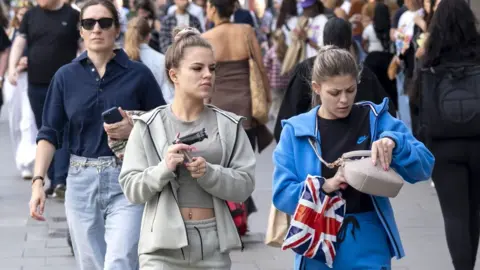 Getty Images
Getty ImagesA long-running measure of how consumers feel about their finances and the economy has fallen sharply, raising concerns that the government’s warning that the Budget will be “painful” has shaken people’s confidence.
GfK’s Consumer Confidence Barometer has tumbled further into negative territory since the end of August.
The index had been recovering after the years of the Covid pandemic, rising prices and higher interest rates had dented the outlook for many.
GfK said the latest measure did not provide “encouraging news” for the UK’s new government, while some economists have linked the drop to Labour’s downbeat rhetoric about the Budget.
Sir Keir Starmer has said the Budget on 30 October will be “painful”, with some taxes set to rise and spending cuts.
Plans to means-test winter fuel payments have already been announced, resulting meaning more than nine million pensioners will not longer be eligible for up to £300 this winter.
The new government has been keen to stress the economic inheritance it has picked up from the previous Conservative administration, but some business leaders, such as the Labour-supporting boss of Iceland, Richard Walker, have warned the government about “doom-laden prophecies”.
Talk of tax rises and increased employment rights has “dented confidence in the environment for business in the UK”, according to the Institute of Directors (IoD) business group.
GfK, a market research company, said there were “major corrections” – or double digit falls – for consumers’ perception of the general economic situation, as well as how likely they were to make big purchases.
People’s view of their own personal finances in the future has also turned negative again, down nine points to -3.
Other measures of consumer confidence have dipped too and overall, the main index fell by seven points to -20.
The fall was unexpected as it came in the aftermath of an interest rate cut from the Bank of England to 5% in August, potentially easing the pressure faced by some households. On Thursday, the Bank pointed to further cuts to borrowing costs, albeit “gradually”.
Inflation, which measures the pace at which prices are rising, has also fallen sharply.
“Despite stable inflation and the prospect of further cuts in the base interest rate, this is not encouraging news for the UK’s new government,” said Neil Bellamy, consumer insights director at GfK.
He suggested that following the withdrawal of winter fuel payments and warnings of “further difficult decisions” to come on tax, spending and welfare, consumers are “nervously” awaiting the upcoming Budget on 30 October.
When asked if “doom and gloom were overdone” last week, Chancellor Rachel Reeves told the BBC: “The latest business surveys continue to show a high degree of confidence in the UK economy because this government has brought stability back.”
She also spoke of how she now wanted to “unlock the huge potential” of the country.
The government has claimed it faces a £22bn “black hole” in the public finances this year, but about £9bn of that reflects Reeves’s decision to award above-inflation public sector pay deals.
Justin King, former chief executive of supermarket Sainsbury’s and current chair of energy supplier Ovo Energy, said that similar to when a company is being turned around, “the first thing you need to do is to get people to a real place”.
“I suspect there’s also a little bit of expectation management going on,” he told the BBC’s Today programme. “They’ll want the Budget to feel it’s not as bad as people are expecting so you might as well get all the bad news out beforehand and then maybe it won’t feel so bad.”
Latest figures showed the UK economy failed to grow in July, a blow for the new government, which has put boosting the economy as one of its key priorities.
The Bank of England has also revised down how much it expects the economy to grow between July and September to 0.3% from 0.4%.
The Bank’s governor Andrew Bailey said on Thursday that he thought underlying confidence was rising but that consumers “want to see evidence that this is sustained”.
He also noted that rising incomes in the wake of inflation spiking had led to a “sharp rise in savings” in the last year – more than the increase in consumer spending.
Although new figures from the Office for National Statistics showed that retail sales rose by 1% in August from 0.7% in July as warmer weather and end of season discounts drew out shoppers.
Households have been hit hard by rising prices and higher interest rates in recent years, but inflation has fallen from its peak in 2022 and held steady at 2.2% in August, just above the Bank’s 2% target.
The chancellor and prime minister are expected to outline a more hopeful, upbeat economic message at the Labour party’s conference next week, and at an important investment summit in mid-October.
But what’s clear is that this is not a government that is rowing back on the message that the Budget will contain tax rises, welfare cuts and government departmental cuts.
